Living with an Indian Village Family: The Full Experience
October 27, 2018
March 2016:
I planned to visit Khajuraho, home of ‘sex temples’, for a day, but ended up there for a month! Allow me to share the story…
The ‘sex temples’ have intricate carvings of sexual imagery and kama sutra positions on all the exterior walls (cue: eyes popping out of sockets).
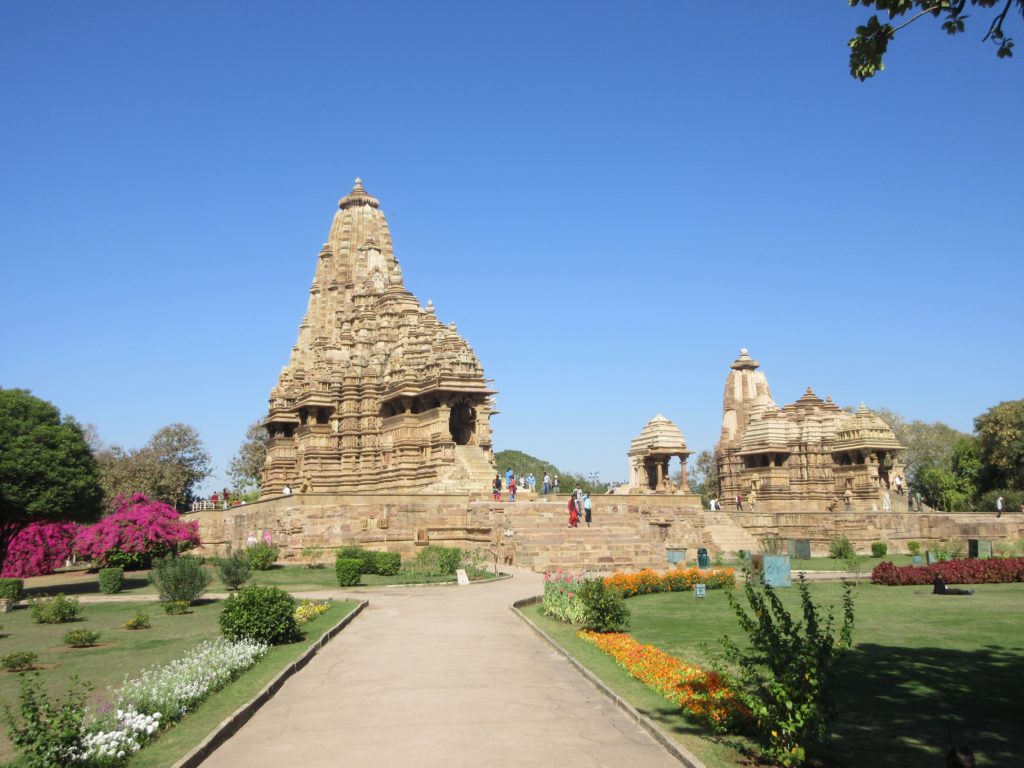
Sex temples on Khajuraho.
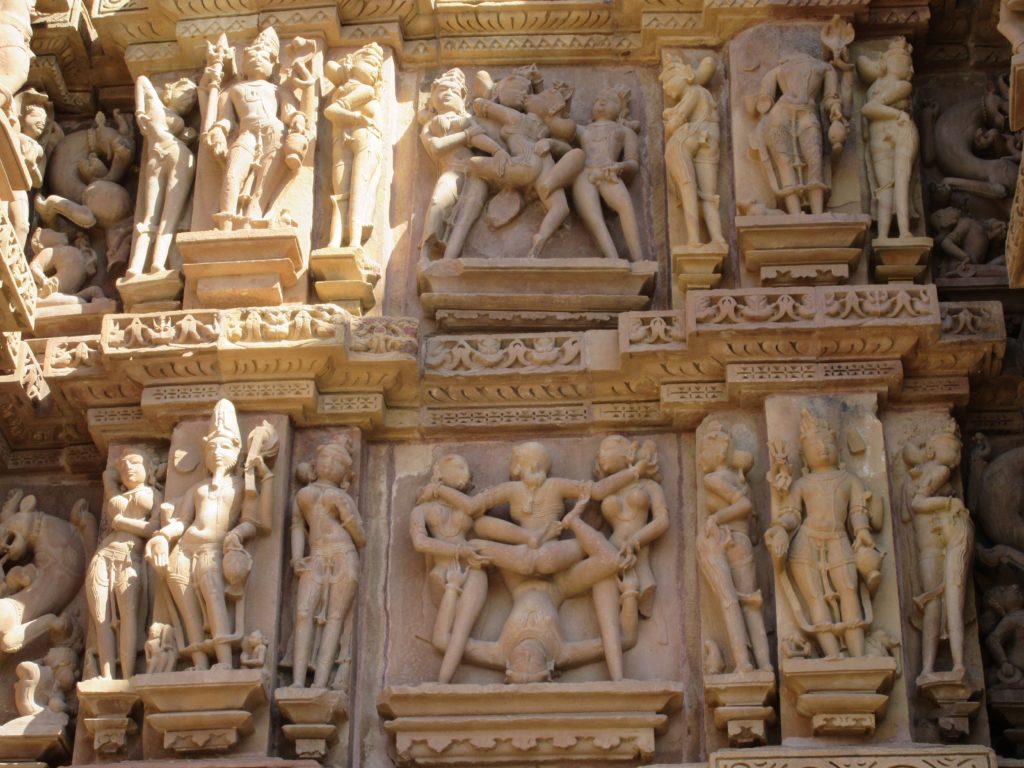
Detailed carvings on the exterior of the temples.
After roaming the temples, I had some time to spare before my next train, I rented a cruiser bicycle to take a ride through the countryside through the wheat fields.
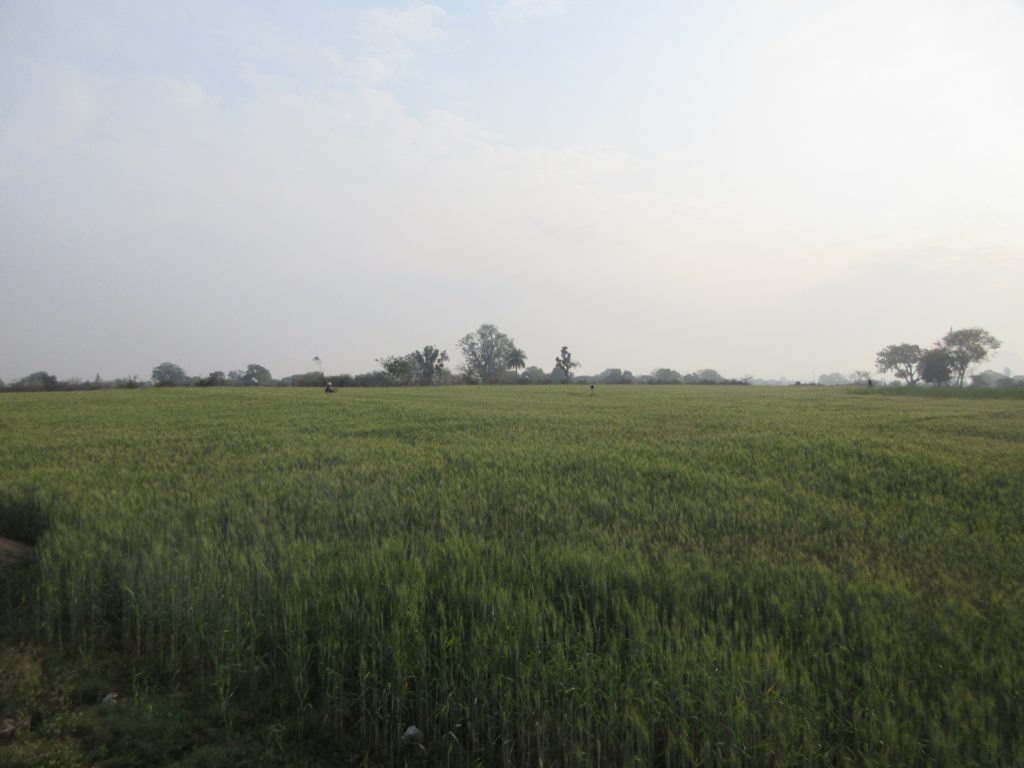
Wheat fields of Melowar village.
After 10 minutes of riding, I stumbled upon a few young Indian guys eating veggies from a farm on the roadside. I pulled over to ask what they’re eating — peas. One of the guys, Kuldeep, informed me this was his brother’s farm, and he invited me to taste the peas. Hells ye.
Kuldeep went on to tell me about the other land his family owns in the area, and he invited me to join him for chai and food at one of the ashrams in the nearby Melowar village.
Screw my train ticket for that evening, I’m staying another night in Khajuraho!
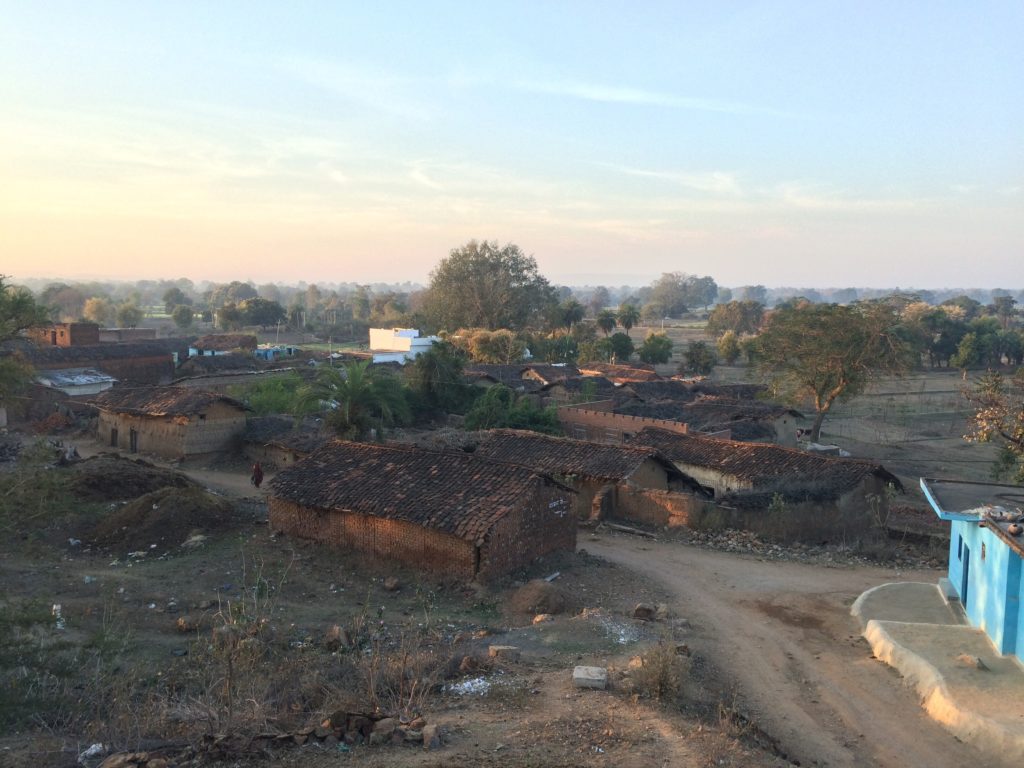
Wheat fields of Melowar village.
We took Kuldeep’s motor bike to the ashram, where we made music on the drums for hours and had chai using fresh buffalo milk (of course it was boiled!). The chai was creamy goodness… so good that I downed 2 cups. Unfortunately after 2 cups, I realized the buffalo milk is so thick and filling, I had no room for dinner.
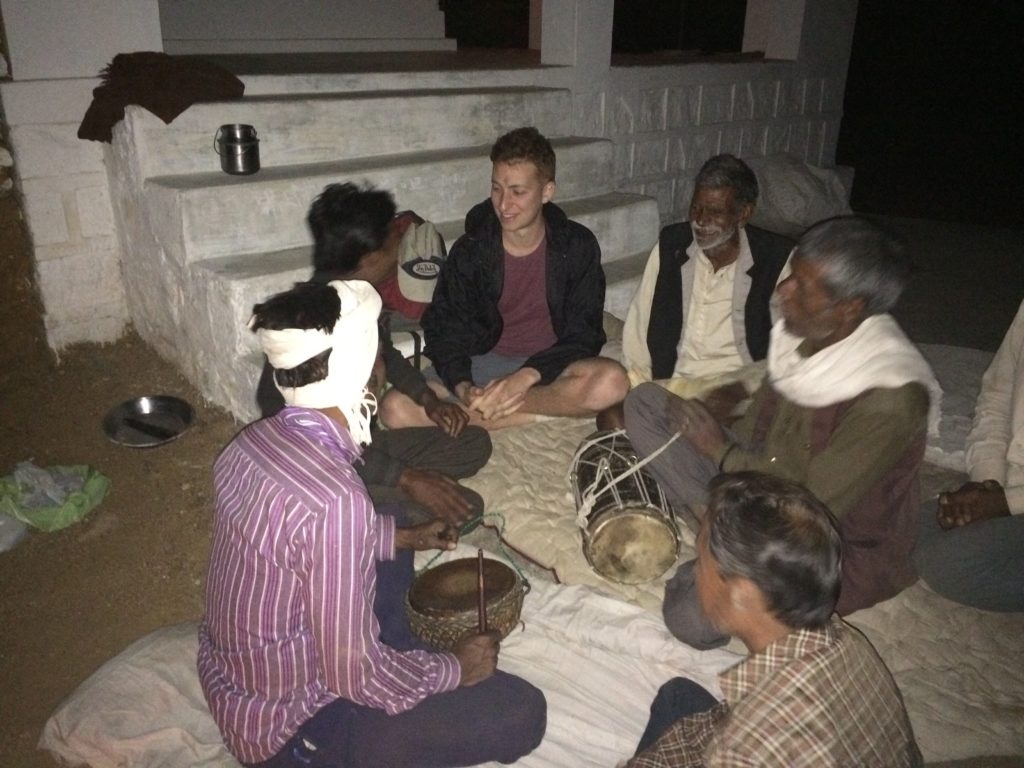
A night in the village – Drum circle all night long at the village ashram.
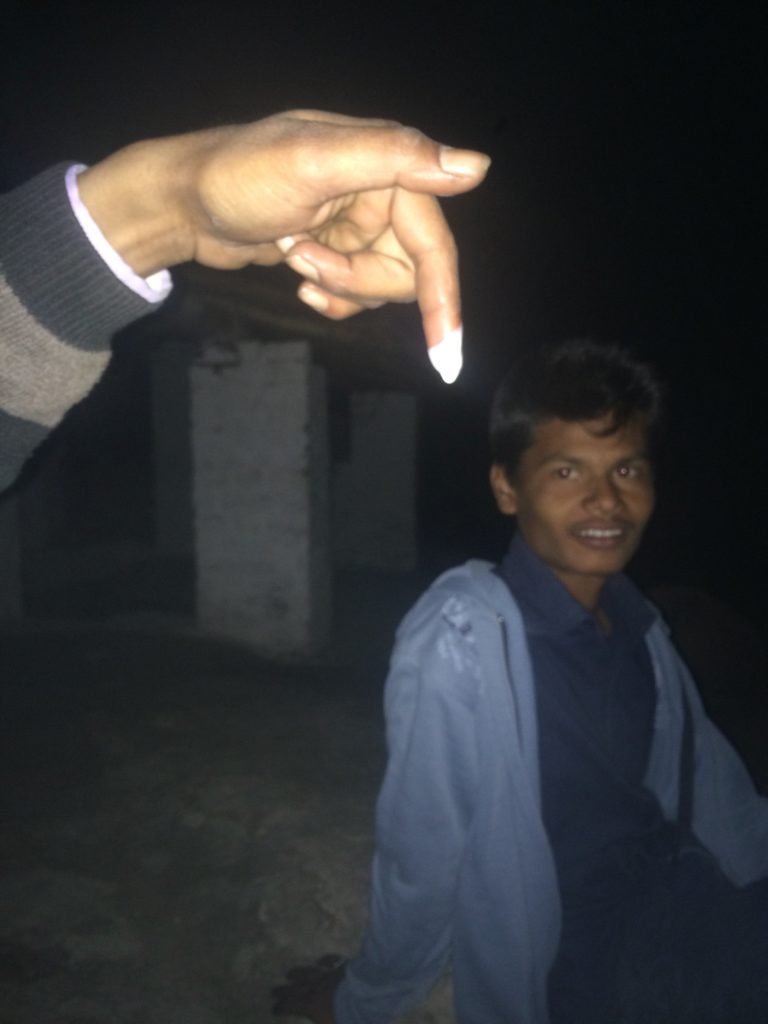
Buffalo milk is so think it sticks to your fingers.
After spending time with villagers at the ashram, we went to another village home where they set up blankets for me to sleep in a tree hut in the wheat fields beneath the stars. What a beautiful site to wake up to in the morning.
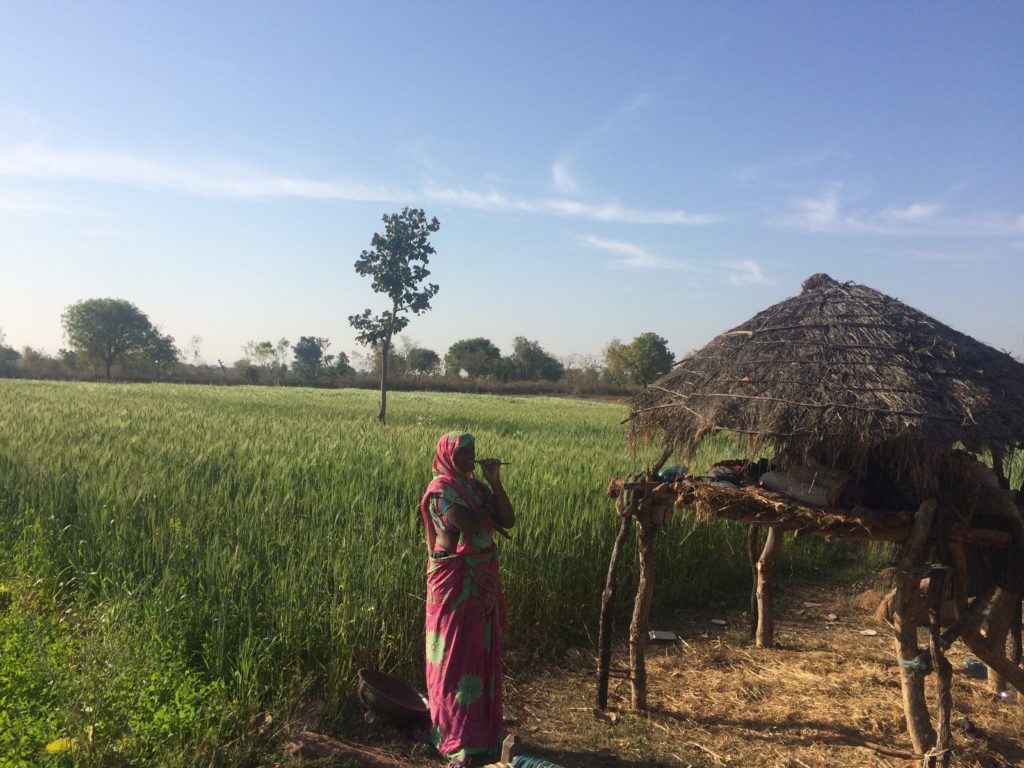
My bed for the night— a tree hut in her midst of the wheat fields of Melowar village. Morning photo!
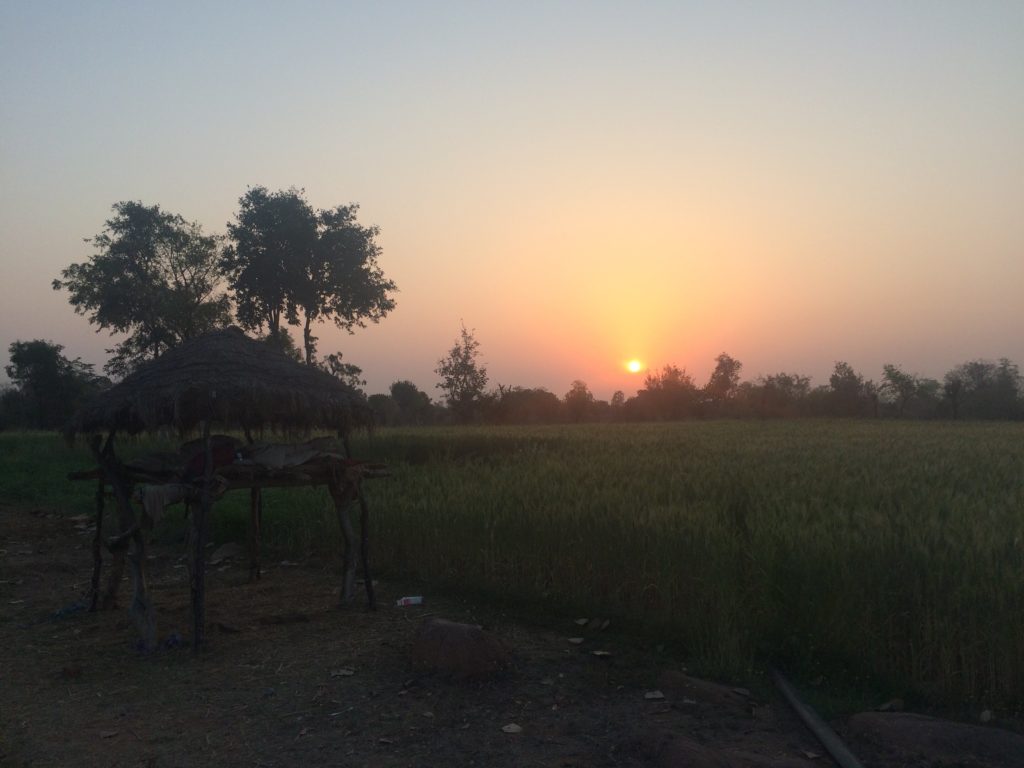
My tree hut bed at sunrise!
The village is only accessible by motorbike, as cars cannot fit through those dirt roads. On the road back to Khajuraho we were blocked by a herd of buffalo.
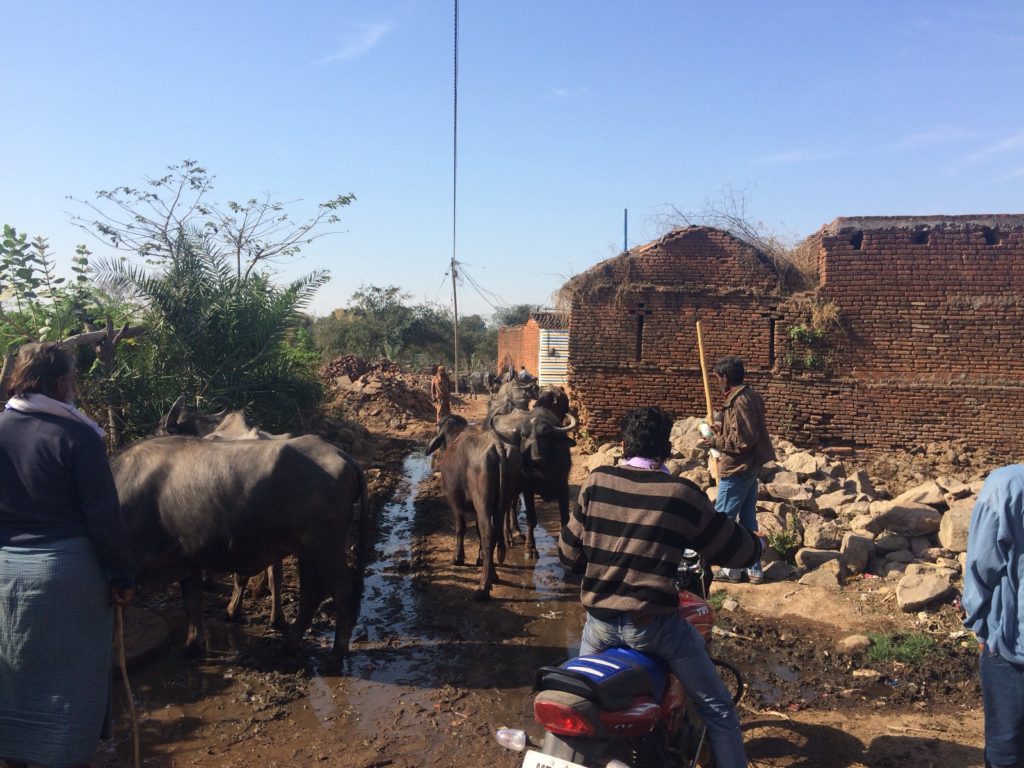
Kuldeep and I on the motorbike heading back from Melowar village. #buffaloroadblock
At this point, I was hooked and ready to explore more of the village life. Kuldeep (23 yrs old) invited me to stay at his home with his family.
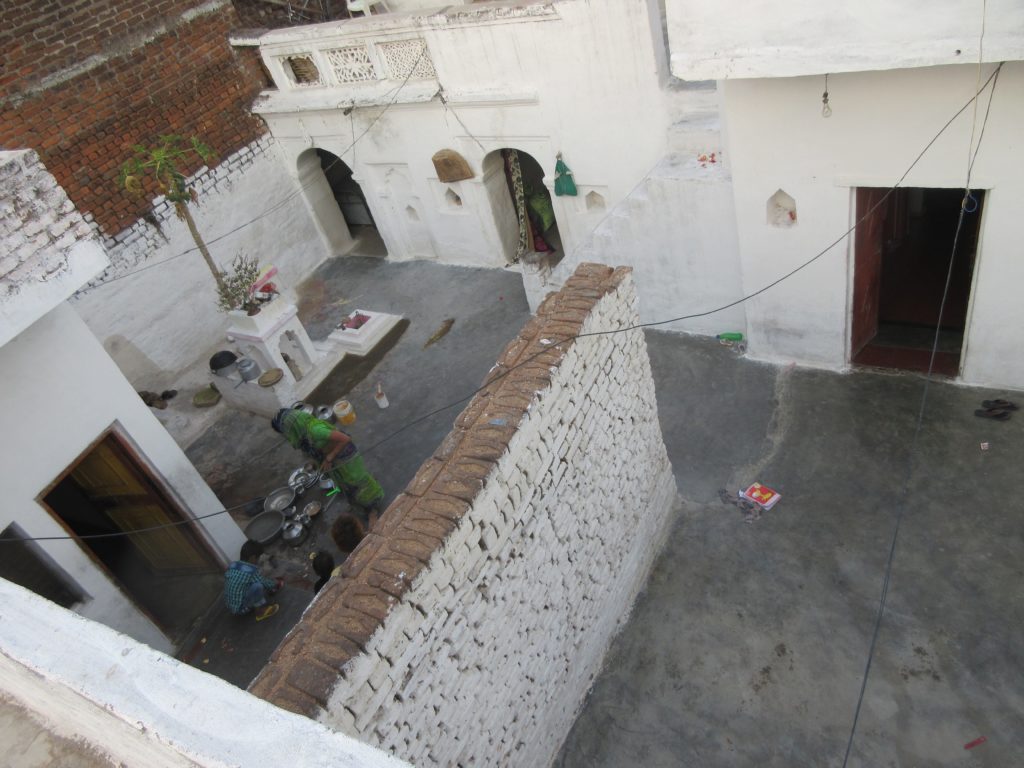
View of Kuldeep’s family home in Khajuraho from the second floor. They cook, wash dishes and
In his Brahmin caste (highest caste) household lives his father, wife (through arranged marriage), son & daughter, his brother, sister-in-law, and nephew.
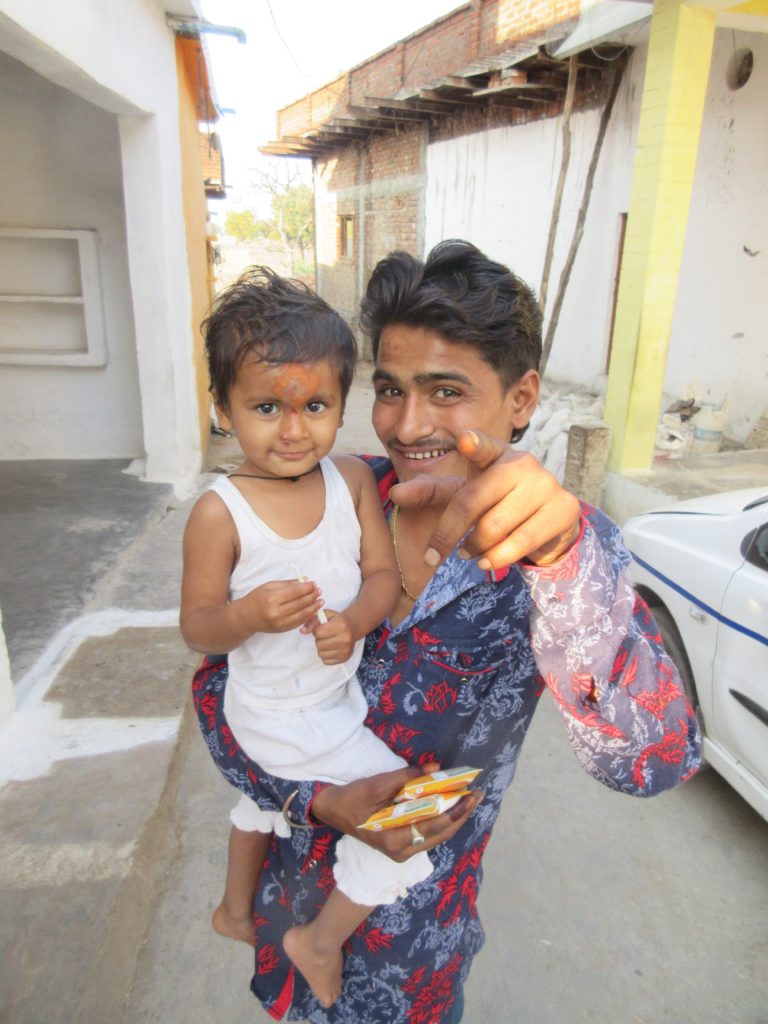
Kuldeep with his daughter, Pari. Pari has the turmeric coloring on her forehead for protection.
Living in Kuldeep’s house meant living a more raw, natural lifestyle. Allow me to give more color:
– No running water (i.e., we pumped all of our water from a water-bell)
– No sink (i.e., brushing my teeth using water bottle, and spitting out over the balcony)
– No shower (i.e., taking a shower, squatting on the floor next to their cows, using buckets of water we pumped from water-bell to rinse myself)
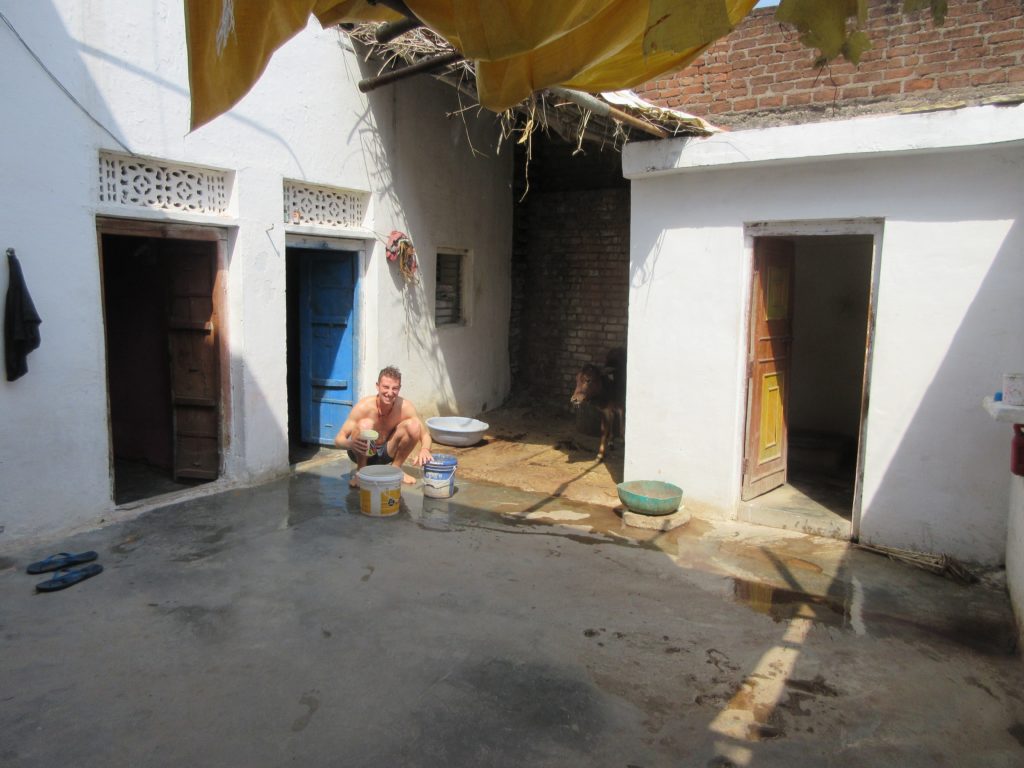
Taking my daily bucket shower next to the cows at Kuldeep’s home.
– No hot water (i.e., if I wanted to take shower, we heated the water in a pot on the stove top)
– No toilet (i.e., taking #1 and #2 outside in the open fields)
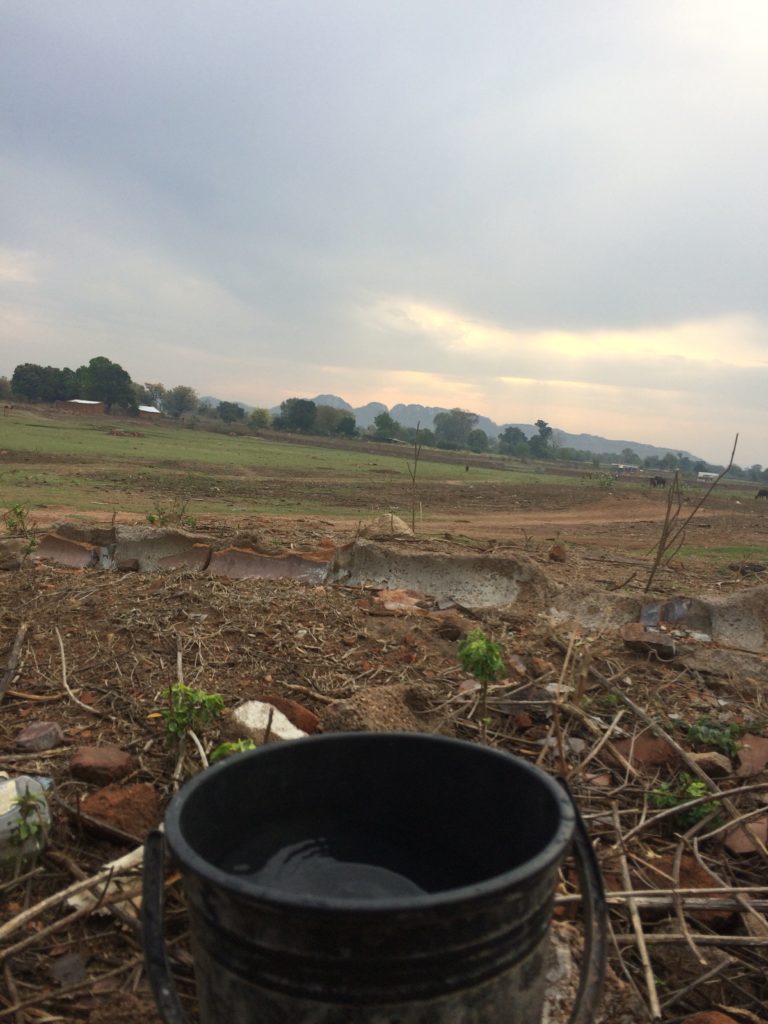
The view from my morning pooping spot in the fields, along with my water bucket for cleaning.
– No toilet paper (i.e., you’re meant to use a bucket of water and your left hand to clean yourself after #2…. I snuck some toilet paper most of the time!). Apparently washing your hands with dirt is just as sanitizing as washing with soap 🤔
– No toothbrushes (i.e., brushing your teeth with Neem tree branches, as the interior of the branch has cleaning properties. Yes, my teeth felt smooth and clean after 😁)
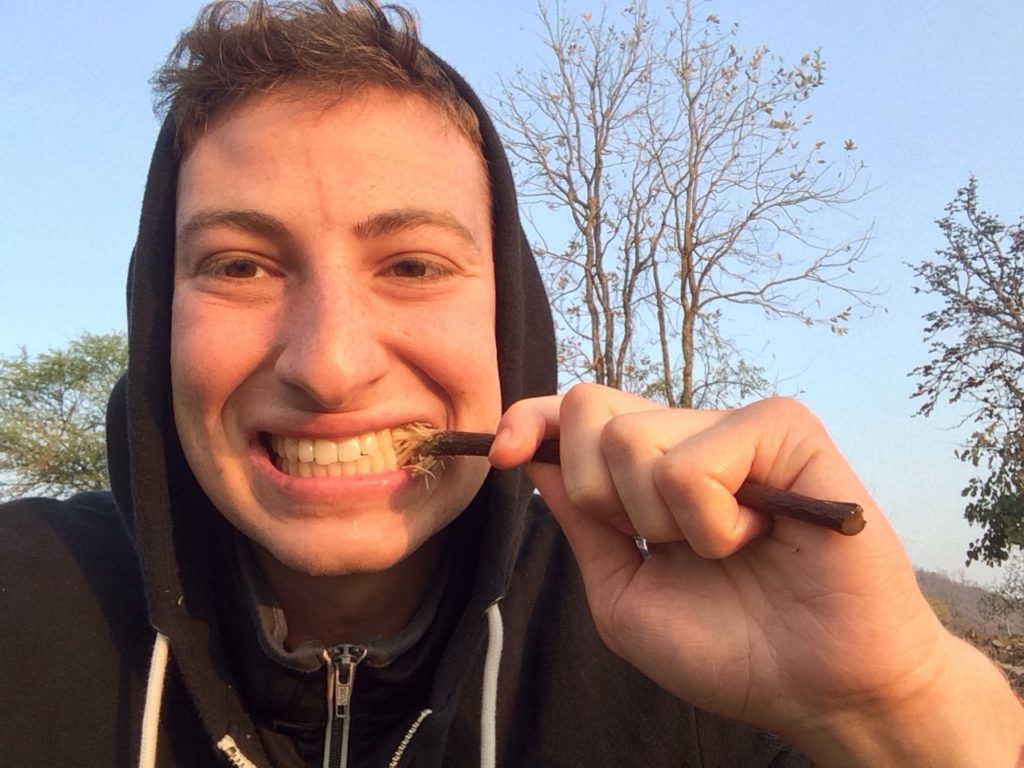
Brushing my teeth with Neem tree branches. Squeaky clean!
– No laundry machine (i.e., handwashing your clothes, and having the Indians laugh at my attempt to do so. Apparently my clothes were still dirty after I washed them.)
– Often no stove tops (i.e., they cook over natural fire made on small stone fire pits.)
– The Indian wives performing the Lakshmi (god of prosperity) ritual each morning (i.e., mixing cow poop with water and smearing it all over the front of the steps of their home using their bare hands.)

The women smear cow dung mixed with water on the doorsteps each morning in Lakshmi’s honor.
– The wives’ delicitable (not a real word) home-cooked food.
– Kuldeep and his family would not accept payment for hosting me in their home. As an alternative, I happily contributed by buying groceries for the family’s meals 🙂
Experiencing the primitive, natural lifestyle we used to live in before the introduction of technology intrigues me! The more I learned about it, the more interested I become.
_________________________________________________
Cut to: Funny “number 2” story
On one of my morning toilet sessions in the fields, I decided to switch up my “number 2” spot. I comfortably squatted down in the shaded area of a giant tree, and started doing my business. After finishing, I began to walk away feeling satisfied, and then I noticed 3 Indian children yelling at me from across the field: “You! You! Don’t do this over there… that is holy tree of Hindu, this is Bhodi tree!!”
I hesitated, unsure how to respond. My luck, I just pooped on a holy tree.
I apologized remorsefully, and I only thought of one way to make it right… I grabbed some empty candy wrappers from the ground, walked over to the Banyan tree, and picked up my poop. I kept my head down in shame, as I carried my poop in hand and threw it onto an unholy pile of garbage.
_________________________________________________
I emailed my family some interesting details of my host, Kuldeep:
“I soon discovered that Kuldeep gets possessed by his gods and his deceased ancestors, as they communicate through him. His grandfather was a Shaman (healer), and his grandfather passed down his ‘powers’ to Kuldeep (his grandson) before he passed away last year. Everyone in the village knows and respects Kuldeep and his family and respects him. He walks into anyone’s home he wants, and the Village people kiss his feet when they see him.
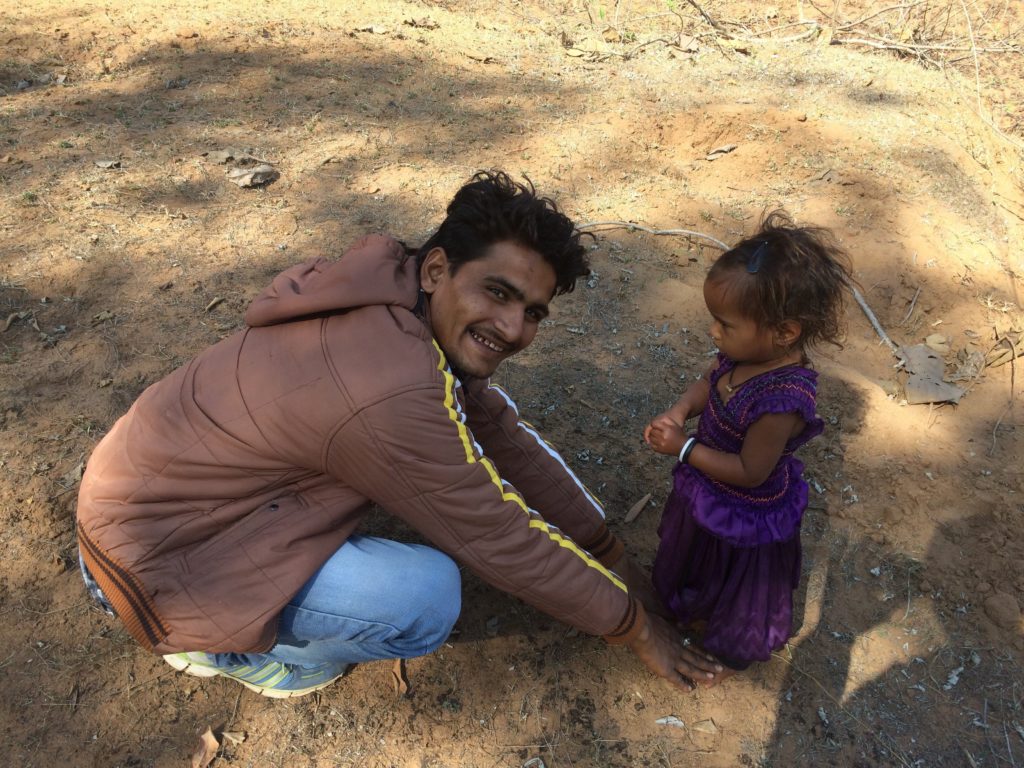
Kuldeep kissing the feet of girls and women in honor of Durga goddess.
At heart, Kuldeep is a truly honest, compassionate, giving, and generous person… which is one area I have been trying to improve upon throughout my journey here. It’s great to spend this time with him.”
Kuldeep and his brother are the only ones in their family who speak English. They learned their English simply by speaking with tourists! But, they can’t read or write in English (they’re learning!) Kuldeep also learned Spanish, French, and a bit of German in the same manner.
Kuldeep’s main trade is managing his farm land mainly growing wheat. During off-season, he’s also a tuk-tuk driver in Khajuraho. When I was living there, we went around on his motorbike 🏍
My insight from the adventure:
I’ve always witnessed extreme poverty during my travels through developing countries, but only from a distance. I visited the favelas of Rio, the Cambodian fishing villages, among other such communities. However, I never comprehended the extent of this poverty, and the primitive conditions certain parts of the world still live under…. until I actually lived it myself.
Living in the under-developed town of old Khajuraho with Kuldeep’s family, and spending time in Melowar village, gave me a new perspective. I am blessed to have directly experienced the primal and impoverished way of life these Indians live in.
Now, I truly understand how they are unable to afford basic needs, such as: soap for bathing, warm clothing for winter, shoes/ slippers for working in the fields, notebooks & pencils so the children can attend school, basic medication for their ailments, or new clothing to replace their old, torn clothing. Now, my eyes and my heart are deeply open. I have a new sympathy for this part of the world.
My time immersed in this culture gave me endless gratitude to have the privilege of being educated, the privilege of having access to medical doctors, the ability to afford a roof over my head, food on the table, and the freedom to express myself.
To end off this post on a light note, here’s an adorable image:
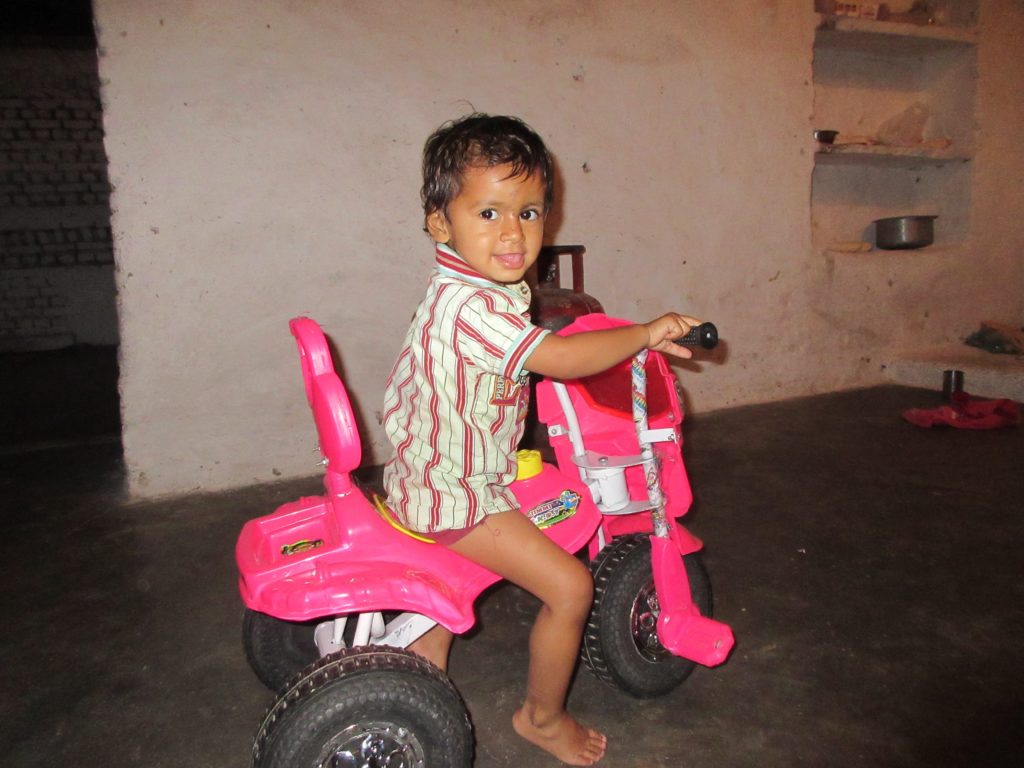
Kuldeep’s daughter, Pari, on her new tricycle… my birthday gift to her 🙂
To be continued with Part 2, where I’ll share my Hindu poojah and ‘good karma’ adventures with the families of Melowar village 🙂
BE THE FIRST TO COMMENT